Mona Bailey
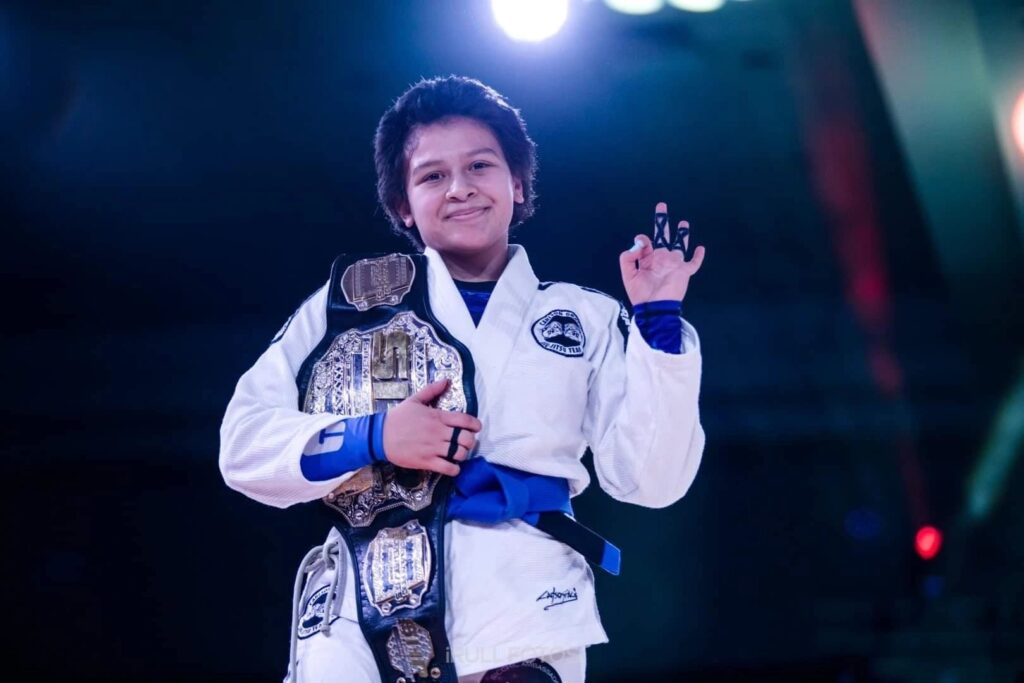
By Evelyn Sutton
An example of perseverance, determination, leadership and strength, the Texas teen continues to rise above adversity, ushering a new era of Jiu-Jitsu women champions, and proving nothing can hold her back.
I called Mona for our interview and her mom answered the phone. They were out shopping. We chatted briefly while Mona was inside the store looking for the final ingredient she needed, polvilho, a cassava flour that is used to make “the Brazilian treat they have at competitions”, she explains once she gets on the phone. Mona is, of course, referring to pão de queijo, a delicious cheesy bread I grew up eating, a staple of Brazilian snack culture, full of taste and history. She tells me how excited she is to bake pão de queijo. “I like to eat”.
Pão de queijo is not the only thing about Brazilian culture and history that Mona enjoys.
Her love for Brazilian Jiu-Jitsu is unmistakable and runs deep in her soul. It’s a huge part of her life. There’s no shortage of sacrifice, dedication and commitment when it comes to training.
Mona’s Jiu-Jitsu journey started early. Now 16 years old, the teenager has been training consistently for 7 years. That’s nearly half of her entire life spent on the mats. And for the most part, it’s always been Jiu-Jitsu.
In the beginning she dabbled in kickboxing soon after transitioning to BJJ. Her brothers and sister followed then her parents joined them for practice.
That’s right, Mona’s entire family trains. One of ten children, six of her siblings train, along with her parents and nephew. As many other young Jiujiteiras have stated before, having her family train and support her is a main ingredient of the “secret recipe” of her success.
As a female competitor, Mona has built up an impressive resume with significant wins at IBJJF, Submission Hunter Pro, BFA and several other events. But wait, she’s just getting started.
Mona trains at Carlson Gracie Houston where she also coaches the Junior Bulldog team. “We have two kids classes, or actually, we had one class first with all our children. Then we decided to split up that class to give everyone more individual attention based on their age and now I handle the little kids. We have a whole class of little kids. I teach the babies and they are the funniest people I’ve ever met. They’re so cute and little. They can also be a handful, at the same time, they’re the best kids ever. I love working with those children.”
She has plans to continue teaching in the future. She wants to coach and eventually open her own gym once she has her black belt. “I wanna open my own gym with my family in the next few years.”
At the time of our interview, Mona was a blue belt. “I will complete a year of having my blue belt on the 14th of December.” Since then she has been promoted to a well-deserved purple belt, an accomplishment that gave her yet another reason for celebration as 2020 comes to an end.
Talking about accomplishments, Mona delivered an incredible performance this year at one of the largest women’s only events in the country, Submission Hunter Pro. She shares how it felt to be part of a movement focused on elevating women in Jiu-Jitsu and creating greater awareness surrounding breast cancer.
“That was a big one. Definitely a bigger deal for me, personally, to compete in because it’s benefits breast cancer awareness. Breast cancer is very prominent in my mom’s side of the family. Both my grandmother and her sister had it. My mother’s aunt, her sister and daughters had it as well. My mom herself, was recently treated for breast cancer. Submission Hunter Pro was an event very close to my heart for this reason. But also just being on the card with so many of the local ladies in Houston was awesome. Being able to share the stage with them and be part of such a big movement in the female BJJ community was an amazing experience.”
When asked how she feels about the current affair of women in Jiu-Jitsu, she believes that we are receiving more support now and there are many more women-only tournaments happening.
“Women are receiving more attention in Jiu-Jitsu and I honestly think it’s a good thing because, you know, this is a very male dominant sport. But more girls are coming to train, and especially this year, there has been a lot of female-only events. It’s been really good. Especially because now we have a lot of high level female black belts who are paving the way for us to have more equal opportunities to compete with the guys.”
In the last few years, there has been a greater understanding of the benefits of Jiu-Jitsu particularly for women. More parents are enrolling their daughters early on in the sport, which gives them the same advantages boys always had. When you start early, Jiu-Jitsu becomes an integral part of your essence, of who you are. As a result, we are witnessing the coming of age of a new generation of ambitious and talented young female black belts, coaches and fierce champions.
Mona leads the way. “There has been a shift not just in the sport, but also with parents encouraging their young daughters to train to build up their confidence and develop self-defense skills in case it ever comes to a situation where they need to protect themselves. And, you know, to make friendships that will last forever.”
Your Jiu-Jitsu family is a bond that stays with you for a lifetime. Mona is grateful to be part of it.
Overcoming Alopecia
Alopecia is an autoimmune disorder which causes hair loss. According to the National Alopecia Areata Foundation, 6.6 million people in American have the condition.
Mona was diagnosed when she was still a young child. Losing your hair is something that can be difficult for anyone to overcome, even more so, a 9-year old. Yet, strong bald Mona, as she is known for her advocacy efforts, didn’t allow the condition to hold her back and instead, became a source of strength and inspiration helping others living with the same condition to find their confidence.
“If you have alopecia, basically it means that your body is allergic to hair. I started losing hair in chunks when I was nine. In the beginning, my mom didn’t know what was going on. She would see these large bald spots on my hair and worry. We went to a dermatologist and I was diagnosed with alopecia. We had never heard of it before. We came home, sat down with all of my siblings and told them. Things were now different, but at the same time, nothing was changing. My family was super supportive.”
Mia credits the support she receives at home and at the gym for her ability to move past the diagnosis from the start.
“I have the best support system at home and at the gym. Being only nine years old and losing my hair was really tough. So they brought somebody in from the National Areata Foundation and he explained to us how I was going to look different from other girls, but I was still the same person. He showed us a video, brought pamphlets on what alopecia is because not a lot of people know about it. I think that was a good first step to make it easier on me at the beginning.”
It’s been a journey of ups and downs that have developed an emotional maturity that serves her well both in life and in BJJ.
“Once my hair started falling out a lot we shaved it since there were only a few little hair spots left and I looked like a Chia Pet”, she jokes. “We shaved my head and my brother shaved his head too. Then my dad did it and my uncle did it. My mom has a picture of that day and I have the biggest smile on my face. That experience shaped me into the person I am now. Having the support of my family is everything.”
She wants to help others overcome the stigma and find inspiration in her story. “I like being an older role model for young children with alopecia who don’t have anybody to relate to. I’m the only one in my family who has it, which is weird because I have a huge family. My sisters have the longest hair ever so it was a weird change for me.”
“When I see people with alopecia or my mother sees them, especially kids, she will chase them down to talk to them because, some people have nobody that can understand and relate to them. We were coming home from Vegas last year and stopped at a small gas station in Texas, there was a little girl who had it, and she had never met anybody else before with alopecia. After meeting me and talking to someone who knows what she is going through – she’s a baby, maybe six years old at the time – her confidence went up and she felt so much better.”
The hair loss comes and goes, currently Mona is sporting a full head of beautiful dark hair, which she is prepared to shave off once it starts falling out again. For the time being, she’s enjoying the new look and having fun with it.
“Now that my hair has come in, it’s long and it’s so weird to train with hair! It’s the perfect length that it gets caught and pulled when people cross face under my neck. And I’m like, Oh, my God, I can’t complain!”, she laughs.
For 2021, Mona plans to compete more in super fights. “Next year will be mostly super fights for me and some local tournaments in Houston.”
When asked about her favorite positions and submissions, she tells us she’s a guard player who likes to triangle people.
Her advice for women in Brazilian Jiu-Jitsu is to keep training and showing up for classes, especially if you are the only female at the gym. “Keep going and training. Being the only female in class is tough. I was the only female in my gym at one point, eventually you get another female in there and she’ll be super fun to train with. But until that happens, keep training and learning. Also visit other places. In Texas, we have a lot of women’s- only offerings. We have female open mats all the time. Look for women’s classes in your area.”
In her opinion, one of the greatest obstacles for women in Jiu-Jitsu is to make themselves relevant. She believes consistency helps. “I know sometimes training only with guys can be a lot but you have to make your presence known. You have to put in the work and don’t let them take it easy on you.”
We talked about the advantages of being a female in BJJ. “There’s not a lot of us. So when you find another woman to train with it’s fun and competitive in a good way. You push each other and help each other grow. When women start training together, it’s good. Girls roll different from guys. We are smaller, we can move around faster.”
“Women also think and react differently in Jiu-Jitsu. It’s more strategic. Our legs are stronger and I see females pull guard more, I see more triangles and spider guard defenses when women roll.”
Currently a junior in high school, the teen is home schooled and that helps create balance due to her demanding training routine. “I do school before I train in the morning. I come home from training, I’ll do more school, and then I’ll go to the gym again at night and finish up whatever is still left for school there. I can juggle both. And I like that. I’m able to train and do school at the same time.”
“I train way too much. I love it. My brother and I started conditioning as well. If we’re not at home, we’re at the gym at least six hours every single day.”
She’s a social girl who enjoys making friends. “I have friends, literally, everywhere. Some of them train, some don’t train at all. When we hang out, we mostly hang out at tournaments. Or when we travel, we’ll stop by to see friends. We go to Vegas a lot to train, and I’ve made many good friends there.”
When it comes to Jiu-Jitsu trailblazers she looks up to, she mentions black belts, Veronica Mota-Messina, Mariana Scott Azevedo and others who inspire her. “These ladies are awesome in Texas. Awesome. Awesome. Fantastic!”
Another woman she looks up to in the sport is her sponsor, Wendy L. Jarva, founder of SicChic.
“She’s an amazing woman. She owns her brand, SicChic, and makes fight gear for women – spats, rashguards – and other sport wear. She was a sponsor for Submission Hunter Pro 60 and I was wearing her set in the nogi fight.”
Mona is a true inspiration for all Jiujiteiras on and off the mats. We wish you much success in the year to come!
Follow Mona on IG:
baldstrongmona
ATHLETES WITH ALOPECIA
Mona is not the only athlete affected by alopecia areata. The condition affects 147 million people in the world, including sport stars. From Olympic medal-winners to football players, they are an example that with passion and determination, nothing can stop you from reaching your dreams.
Joanna Rowsell, British cyclist
Olympic world champion, Joanna started losing her hair at 10 years old. Yet she didn’t allow the condition to define her. “I always had bald spots but over time it all started coming out in clumps,” she said. “People say I was brave to go on the podium in the Olympics with my bald head but I just wanted to get my medal.”
Joshua Dobbs, Jaguars QB
A real rocket scientist with a degree in aerospace engineering, Joshua is a NFL quarterback with the Jacksonville Jaguars and a prominent advocate for those with alopecia areata, a condition he has had since childhood.
Charlie Villanueva, NBA basketball player
Diagnosed with alopecia when he was 10, Villanueva’s hair fell out in pieces, and by 12 he was bald. That made his life in middle school very hard. Today, he helps children overcome the fear and the shame, “I want kids to know that just because you have alopecia, alopecia doesn’t have you. If you let it have you, it’s going to tear you down.”

Our printed magazine is full of extraordinary women with extraordinary stories, get your printed copy via mail today >



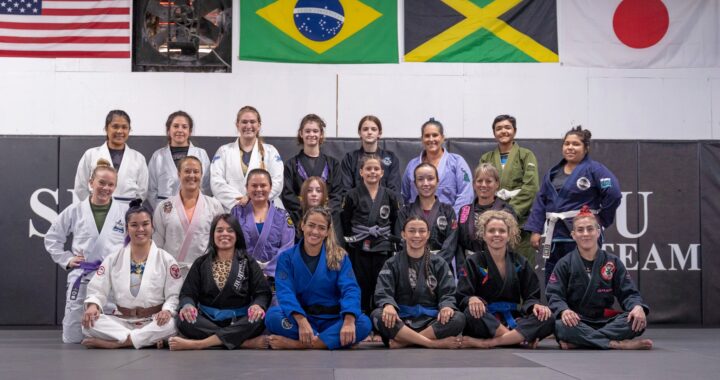 The Jiujiteira Sisterhood
The Jiujiteira Sisterhood  ADGS Rome: Jiujiteiras Shine in the Land of the Colosseum
ADGS Rome: Jiujiteiras Shine in the Land of the Colosseum 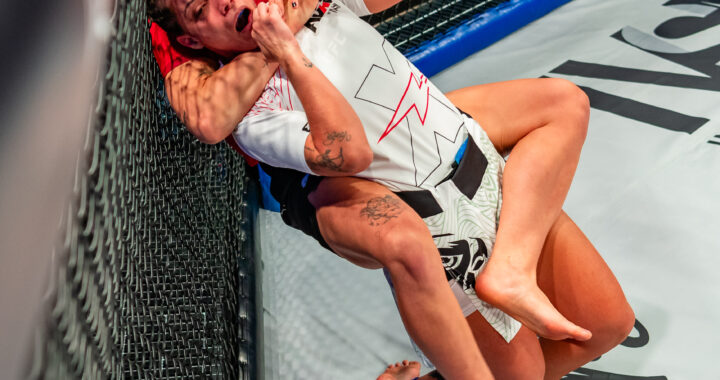 Ffion Davies: Unmatched Dominance at ADXC2
Ffion Davies: Unmatched Dominance at ADXC2 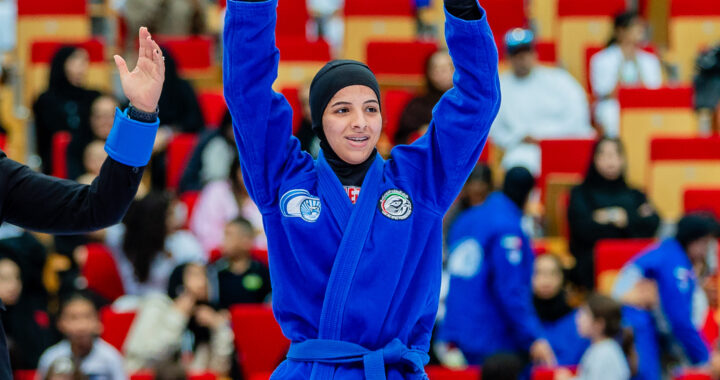 Winners of Mother of the Nation Jiu-Jitsu Cup are celebrated in Abu-Dhabi
Winners of Mother of the Nation Jiu-Jitsu Cup are celebrated in Abu-Dhabi 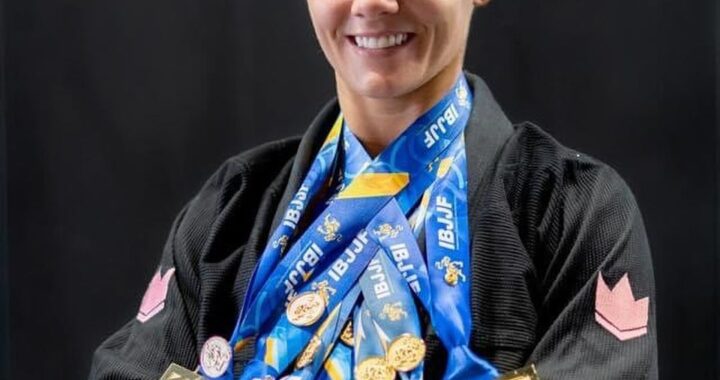 Maggie Grindatti Hangs Up the Gi: A Transition from BJJ Athlete to Fitness Coach
Maggie Grindatti Hangs Up the Gi: A Transition from BJJ Athlete to Fitness Coach 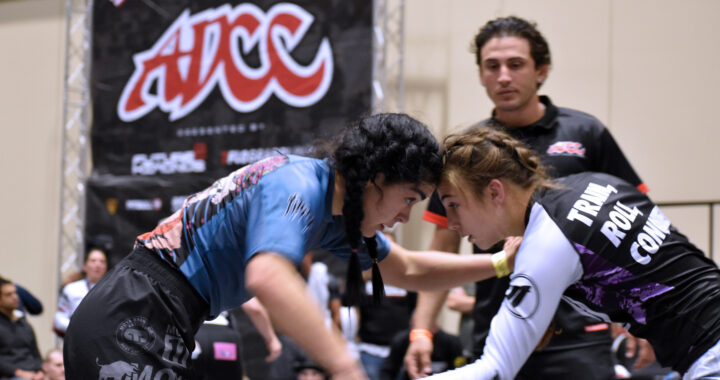 Jiujiteiras deliver intense battles and remarkable performances at ADCC Orlando Open
Jiujiteiras deliver intense battles and remarkable performances at ADCC Orlando Open 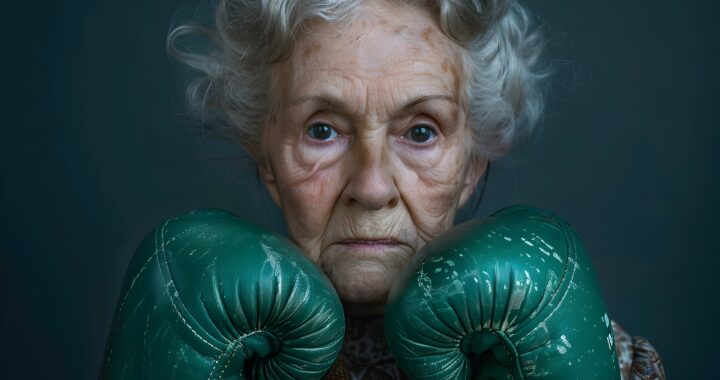 Father Time is Undefeated
Father Time is Undefeated 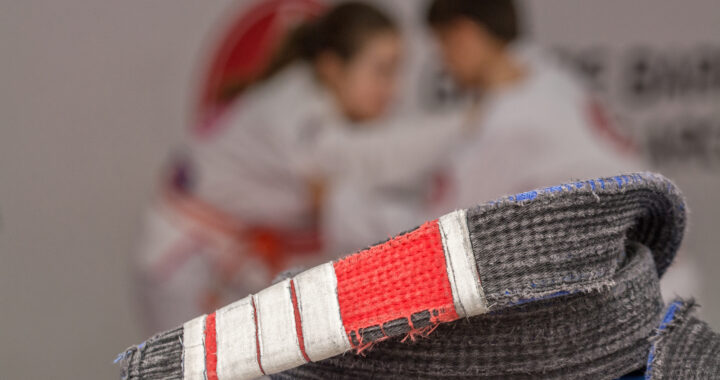 Advice in the Ranks- From White to Black
Advice in the Ranks- From White to Black